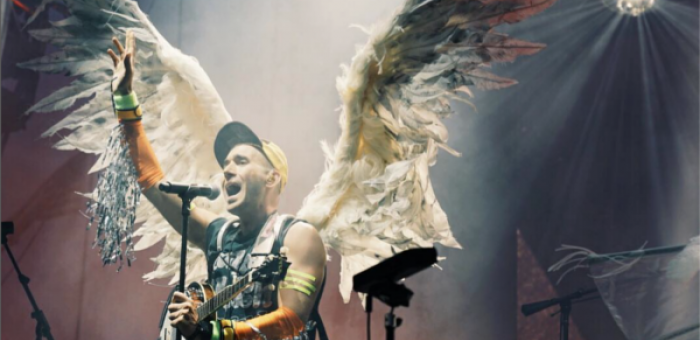Jan 13, 2026 2:09 PM
More Trump-Kennedy Center Cancellations
The fallout from the renaming of the John F. Kennedy Center for the Performing Arts to include President Donald…

Sufjan Stevens performs at the Pitchfork Music Festival in Chicago on July 16.
(Photo: Courtesy of Pitchfork Music Festival/Instagram)Chicago played host to the 11th edition of the Pitchfork Music Festival on July 15–17, as thousands of attendees flocked to the city’s Union Park to enjoy a diverse lineup spanning genres and generations.
The most memorable performance was the headliner for July 16, singer-songwriter Sufjan Stevens, who, with his nine-piece band, reworked and updated music from throughout his discography, combining it with captivating visuals, dancing and endless charisma.
At the beginning of the show, Stevens shared that, after a year and a half of performing sad songs about death and loneliness— subjects explored on his latest album, Carrie And Lowell (Asthmatic Kitty)—he wanted to revel in music that was more upbeat and fun.
The short disclaimer set the tone for the rest of his performance. Even during the sad songs Stevens conveyed a hopeful attitude, tweaking the music to celebrate life in the face of death, and to portray his acceptance of life’s rougher moments. The accompanying musicians apparently shared Stevens’ optimism, their ecstatic moods reflected in their bright neon costumes. For opener “Swan Song” some wore angel wings (or were they swans’ wings?).
With such a large, flexible ensemble, Stevens could achieve a wide variety of sonic textures, from spare arrangements performed by a few players to grand, sweeping statements from the full band. During the stripped-down reading of “For The Widows In Paradise, For The Fatherless In Ypsilanti,” from his 2003 album Michigan, Stevens traveled back to his folk roots, accompanying his voice with banjo.
Much of the program displayed his exceptional skills as both composer and arranger, with several songs that blended singers and wind instruments in lush harmonies, often supported by thick, captivating synths and percussion.
The concert had many peaks, but the last three songs instilled the most awe. With conviction, energy and an elaborate costume made of balloons, Stevens and the band performed the 30-minute “Impossible Soul,” from his 2005 album, The Age Of Adz. The song was a perfect climax, featuring pulsing synths and percussion, intense colors and exhilarating vocals.
Stevens followed this with the expected and greatly appreciated “Chicago,” one his most popular songs. Needless to say, the Windy City crowd eagerly sang along. To close, the group covered Prince’s “Kiss,” with Moses Sumney (who performed a solo set on Friday) leading on vocals.
Another highly anticipated act on July 17 was Brian Wilson performing the Beach Boys’ 1966 album Pet Sounds in its entirety (followed by several of the band’s hits). Wilson seemed tired, as if a combination of age and mental fatigue had taken its toll. However, the band did an admirable job of working with the singer to enliven this time-tested material; they didn’t play a facsimile of the album, with Wilson merely present in the rehashing. Rather, they made the music feel new and invigorated. The ’60s are long gone, but the spirit of that radical decade was no doubt imparted to the audience during this heartening performance.
Earlier in the day, the hip-hop collective Digable Planets and the producer Blood Orange (aka Dev Hynes) both delivered memorable sets. Digable Planets might be far removed from its early ’90s heyday, but the group’s stellar performance of jazz-infused hip-hop showed that these musicians are all still listening and staying hip to both genres. Blood Orange’s funky concert also had a bit of jazz influence—his band used Coltrane’s A Love Supreme as a musical interlude between songs.
Fest highlights for July 16 included the sets by Car Seat Headrest, Whitney and Twin Peaks. All three groups rocked out, drawing big crowds despite their early time slots. Beach House closed the day with a serene and dreamy ambience, promoting love for one another.
Fans of improvised music showed up in large numbers on July 17 for a lineup that included the Sun Ra Arkestra, Thundercat and Kamasi Washington, who topped three categories in the 2016 DownBeat Critics Poll, including Jazz Album, for his three-disc set The Epic (Brainfeeder).

Belá Fleck during an interview with Fredrika Whitfield on CNN.
Jan 13, 2026 2:09 PM
The fallout from the renaming of the John F. Kennedy Center for the Performing Arts to include President Donald…

Peplowski first came to prominence in legacy swing bands, including the final iteration of the Benny Goodman Orchestra, before beginning a solo career in the late 1980s.
Feb 3, 2026 12:10 AM
Ken Peplowski, a clarinetist and tenor saxophonist who straddled the worlds of traditional and modern jazz, died Feb. 2…

The success of Oregon’s first album, 1971’s Music Of Another Present Era, allowed Towner to establish a solo career.
Jan 19, 2026 5:02 PM
Ralph Towner, a guitarist and composer who blended multiple genres, including jazz — and throughout them all remained…

Rico’s Anti-Microbial Instrument Swab
Jan 19, 2026 2:48 PM
With this year’s NAMM Show right around the corner, we can look forward to plenty of new and innovative instruments…

Richie Beirach was particularly renowned for his approach to chromatic harmony, which he used to improvise reharmonizations of originals and standards.
Jan 27, 2026 11:19 AM
Richie Beirach, a pianist and composer who channeled a knowledge of modern classical music into his jazz practice,…